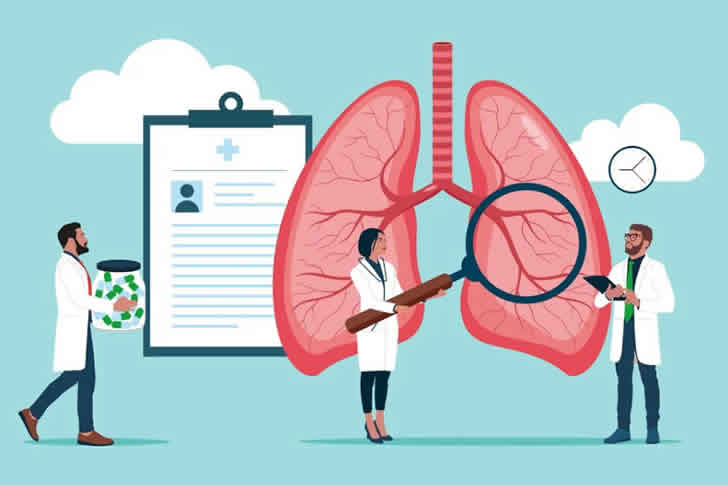Dealing with Non-Small Cell Lung Cancer (NSCLC) is challenging. Fortunately, advancements in targeted therapies and immunotherapy provide new avenues for treatment. This guide offers advice and tips for navigating these options.

Dealing with Non-Small Cell Lung Cancer (NSCLC) is challenging. Fortunately, advancements in targeted therapies and immunotherapy provide new avenues for treatment. This guide offers advice and tips for navigating these options.
Understanding NSCLC (Non-Small Cell Lung Cancer)
NSCLC accounts for approximately 85% of all lung cancer cases, making it the very common type of lung cancer. It encompasses several subtypes, including adenocarcinoma, squamous cell carcinoma, and large cell carcinoma. Understanding these subtypes and their unique characteristics can help tailor treatment options.
Key Points:
Diagnosis
: Accurate diagnosis often involves imaging tests, biopsies, and molecular testing to identify specific genetic mutations.Symptoms
: Common symptoms include shortness of breath, persistent cough, chest pain, and unexplained weight loss.Stages
: NSCLC is classified into four stages, from I (localized) to IV (metastatic). Treatment strategies vary significantly depending on the stage.Exploring Targeted Therapies for NSCLC
Targeted therapies are designed to target specific genetic mutations within cancer cells, offering more precision in treatment compared to traditional chemotherapy. These therapies can be particularly effective for patients with certain genetic profiles.
Key Targeted Therapies:
EGFR Inhibitors
: EGFR mutations are common in NSCLC, especially among non-smokers. Drugs like erlotinib and gefitinib can block signals that promote cancer cell growth.ALK Inhibitors
: For patients with ALK rearrangements, drugs like crizotinib and alectinib have shown significant effectiveness.ROS1 and BRAF Inhibitors
: For those with ROS1 rearrangements or BRAF mutations, therapies like crizotinib and dabrafenib are options.Other Mutations
: Targeted therapies continue to expand, addressing mutations like MET, RET, and NTRK.Tips for Patients:
Genetic Testing
: Ensure comprehensive molecular testing to identify actionable mutations, which can open doors to targeted treatments.Medication Adherence
: Strictly follow the prescribed dosage and schedule. Skipping doses can reduce effectiveness.Monitor Side Effects
: Common side effects include rash, diarrhea, and liver function changes. Report these to your doctor for management.Stay Informed
: Targeted therapies are a rapidly advancing field. Regular consultations with an oncologist can help keep you updated on new treatments.
Utilizing Immunotherapy for NSCLC
Immunotherapy harnesses the body's immune system to recognize and attack cancer cells. It's a major breakthrough for NSCLC treatment, particularly for those without actionable mutations.
Key Immunotherapies:
Checkpoint Inhibitors
: Drugs like pembrolizumab (Keytruda) and nivolumab (Opdivo) block proteins (PD-1/PD-L1) that prevent the immune system from attacking cancer cells.Combination Therapies
: Combining immunotherapy with chemotherapy or targeted therapy can enhance treatment effectiveness.Tips for Patients:
Eligibility
: Not all patients are suitable candidates. PD-L1 expression levels and other factors determine eligibility. Discuss with your doctor.Monitor Response
: Immunotherapy may take longer to show results compared to other treatments. Regular scans and tests will monitor progress.Side Effects
: Immune-related side effects can include fatigue, skin reactions, and inflammation of organs. Promptly report any unusual symptoms.Lifestyle Choices
: A healthy diet, regular exercise, and stress management can support overall well-being and potentially improve treatment outcomes.
Integrating Targeted Therapies and Immunotherapy
Combining targeted therapies and immunotherapy can sometimes yield better outcomes for NSCLC patients. This multi-modal approach requires careful coordination between treatment types.
Steps to Consider:
Treatment Planning
: Collaborate with a multi-disciplinary team, including oncologists, radiologists, and surgeons.Clinical Trials
: Enrolling in clinical trials can provide access to new combination therapies and protocols that are not yet widely available.Continuous Monitoring
: Combination therapy often requires close monitoring to manage overlapping side effects and to determine overall efficacy.Personalized Approach
: Tailor treatments based on individual patient profiles, including genetic makeup and overall health status.Additional Support and Resources
Finding Support:
Counseling Services
: Emotional and psychological support is crucial. Accessing counseling services can help manage stress and anxiety.Support Groups
: Joining NSCLC support groups provides a platform to share experiences and gain insights from others in similar situations.
Resource Centers:
National Cancer Institute (NCI)
: Offers comprehensive resources on NSCLC, including treatment options and research updates.American Lung Association
: Provides educational materials, support networks, and advocacy opportunities for lung cancer patients.
Conclusion
Managing Non-Small Cell Lung Cancer through targeted therapies and immunotherapy offers promising pathways for treatment. By understanding these options, adhering to prescribed treatments, and staying informed, patients can navigate their journey with greater confidence and hope. Always work closely with your healthcare team to determine the top approach tailored to your unique situation.









